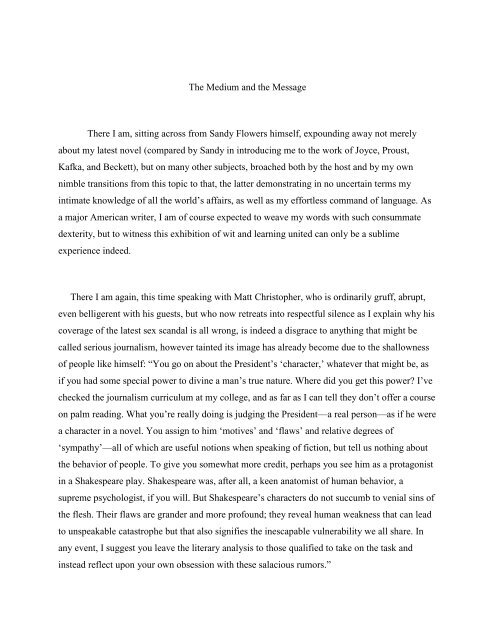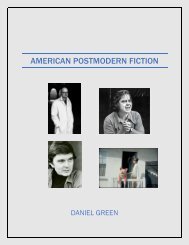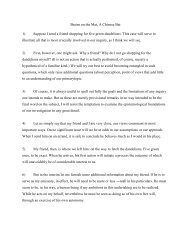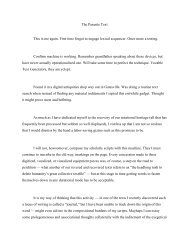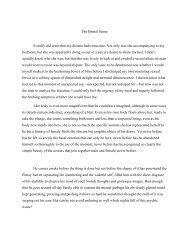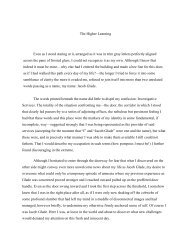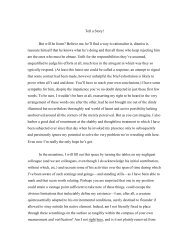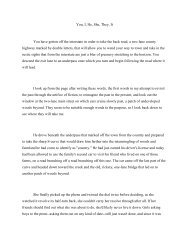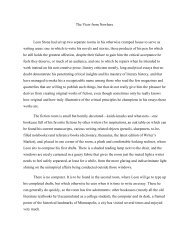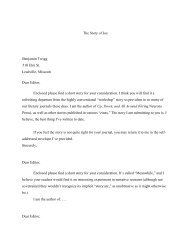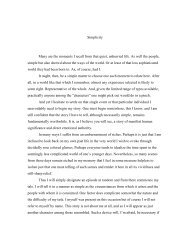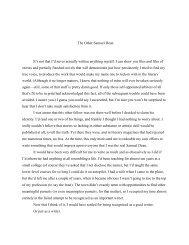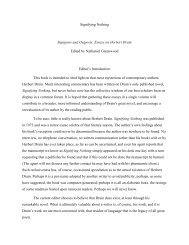The Medium and the Message
Create successful ePaper yourself
Turn your PDF publications into a flip-book with our unique Google optimized e-Paper software.
<strong>The</strong> <strong>Medium</strong> <strong>and</strong> <strong>the</strong> <strong>Message</strong><br />
<strong>The</strong>re I am, sitting across from S<strong>and</strong>y Flowers himself, expounding away not merely<br />
about my latest novel (compared by S<strong>and</strong>y in introducing me to <strong>the</strong> work of Joyce, Proust,<br />
Kafka, <strong>and</strong> Beckett), but on many o<strong>the</strong>r subjects, broached both by <strong>the</strong> host <strong>and</strong> by my own<br />
nimble transitions from this topic to that, <strong>the</strong> latter demonstrating in no uncertain terms my<br />
intimate knowledge of all <strong>the</strong> world’s affairs, as well as my effortless comm<strong>and</strong> of language. As<br />
a major American writer, I am of course expected to weave my words with such consummate<br />
dexterity, but to witness this exhibition of wit <strong>and</strong> learning united can only be a sublime<br />
experience indeed.<br />
<strong>The</strong>re I am again, this time speaking with Matt Christopher, who is ordinarily gruff, abrupt,<br />
even belligerent with his guests, but who now retreats into respectful silence as I explain why his<br />
coverage of <strong>the</strong> latest sex sc<strong>and</strong>al is all wrong, is indeed a disgrace to anything that might be<br />
called serious journalism, however tainted its image has already become due to <strong>the</strong> shallowness<br />
of people like himself: “You go on about <strong>the</strong> President’s ‘character,’ whatever that might be, as<br />
if you had some special power to divine a man’s true nature. Where did you get this power? I’ve<br />
checked <strong>the</strong> journalism curriculum at my college, <strong>and</strong> as far as I can tell <strong>the</strong>y don’t offer a course<br />
on palm reading. What you’re really doing is judging <strong>the</strong> President—a real person—as if he were<br />
a character in a novel. You assign to him ‘motives’ <strong>and</strong> ‘flaws’ <strong>and</strong> relative degrees of<br />
‘sympathy’—all of which are useful notions when speaking of fiction, but tell us nothing about<br />
<strong>the</strong> behavior of people. To give you somewhat more credit, perhaps you see him as a protagonist<br />
in a Shakespeare play. Shakespeare was, after all, a keen anatomist of human behavior, a<br />
supreme psychologist, if you will. But Shakespeare’s characters do not succumb to venial sins of<br />
<strong>the</strong> flesh. <strong>The</strong>ir flaws are gr<strong>and</strong>er <strong>and</strong> more profound; <strong>the</strong>y reveal human weakness that can lead<br />
to unspeakable catastrophe but that also signifies <strong>the</strong> inescapable vulnerability we all share. In<br />
any event, I suggest you leave <strong>the</strong> literary analysis to those qualified to take on <strong>the</strong> task <strong>and</strong><br />
instead reflect upon your own obsession with <strong>the</strong>se salacious rumors.”
I first appeared on television when I was twenty-seven years old. I was President of my<br />
department’s graduate student association (usually my job entailed arranging our annual picnic<br />
or cajoling professors to donate books to our periodic book sales, <strong>the</strong> money from <strong>the</strong> latter being<br />
used to fund <strong>the</strong> former), <strong>and</strong> we were engaged in a dispute with <strong>the</strong> university over salaries for<br />
teaching assistants. I was interviewed by a local station on my way into a meeting with a group<br />
of administration mucky-mucks. I don’t remember exactly what I said, but I do remember that<br />
much of <strong>the</strong> interview was actually broadcast on that evening’s news report. Most of this<br />
station’s reporters were students <strong>the</strong>mselves, so it wasn’t <strong>the</strong> most polished piece I’ve ever seen,<br />
but unlike my now wife, who ran from <strong>the</strong> room when it was introduced, no doubt sensing<br />
imminent embarrassment, I thought I came across ra<strong>the</strong>r well. I wasn’t exactly telegenic<br />
(although nei<strong>the</strong>r was I repulsive), but I sure as hell sounded like I knew what I was talking<br />
about <strong>and</strong> was reasonably crisp <strong>and</strong> cogent. I had no particular desire to be on television—truth<br />
be told, I was like everyone else in my circle in regarding it largely with contempt—but if this<br />
was <strong>the</strong> medium through which one could most widely circulate one’s message, I was not yet<br />
inclined to dismiss it altoge<strong>the</strong>r.<br />
He had that squint in his eye that makes him look like a choleric gangster (luckily he was<br />
wearing his moustache at <strong>the</strong> time—without it he looks like a small-time drug dealer), <strong>and</strong> his<br />
voice seemed even more nasal <strong>and</strong> unmodulated than in real life. He thought I’d left <strong>the</strong> room,<br />
but I peeked around <strong>the</strong> corner just long enough to see that he made a very unpleasant impression<br />
on television <strong>and</strong> to know that in <strong>the</strong> future he should avoid speaking in public forums at all<br />
costs. I wasn’t that convinced he’d ever find his way into print, ei<strong>the</strong>r, but at least if he was just a<br />
writer no one would have to know what he was truly like in person. Obviously <strong>the</strong>re were o<strong>the</strong>r<br />
things about <strong>the</strong> man I liked perfectly well—o<strong>the</strong>rwise I certainly would not have married him—<br />
but I’m very glad he stuck to writing stories as a means of expressing himself <strong>and</strong> left <strong>the</strong><br />
television chatter to those with <strong>the</strong> talking heads for it.
When my first book was published I agreed to appear on our community’s version of a tv<br />
“cultural affairs” program. I will agree that it didn’t really work out. <strong>The</strong> host was a retired<br />
professor in ano<strong>the</strong>r department, who, though o<strong>the</strong>rwise a thoroughly amiable fellow, knew<br />
nothing about my work <strong>and</strong> very little about literature period. He could only ask me which of my<br />
characters were based on real people I had known, if I agreed that modern literature was much<br />
too depressing, <strong>and</strong> whe<strong>the</strong>r I had ever thought about writing children’s stories. I tried to answer<br />
<strong>the</strong>se questions with as much equanimity as I could muster, but I cannot deny I possess a certain<br />
snobbishness about what I do, <strong>and</strong> am told that on this occasion I was not entirely successful in<br />
concealing it. I said nothing outrageous, although I did try to make it clear I considered <strong>the</strong> first<br />
question irrelevant to <strong>the</strong> book I had written <strong>and</strong> <strong>the</strong> second to indicate a personal preference I<br />
did not share. (<strong>The</strong> third was easy to answer: No, I had not.) Apparently my tone was overly<br />
dismissive, as <strong>the</strong> host seemed reluctant to ask any more questions. He invited me to speak of my<br />
book in any way I wished, but I could think of nothing that wouldn’t sound tediously affected<br />
under <strong>the</strong> circumstances. (“Well, Phil, my stories explore <strong>the</strong> process of fiction-making itself, as<br />
a way of depicting <strong>the</strong> ways in which ‘reality’ might be a product of our own imaginative<br />
projections.”) After a few additional questions about my work habits from <strong>the</strong> host, <strong>and</strong> my<br />
desultory responses—even I find my work habits a boring topic—<strong>the</strong> show mercifully was over.<br />
Suffice it to say I was never again invited to appear on this program, although it is, I believe, still<br />
on <strong>the</strong> air.<br />
It was undoubtedly <strong>the</strong> worst show we ever did. Some of my friends in <strong>the</strong> English<br />
department warned me that he was a prickly sort, but I wouldn’t have guessed that he thought<br />
quite that much of himself. He’d just published his book, to be sure (<strong>and</strong> at this school we’re<br />
always thoroughly delighted when one of our people gets into print), but it wasn’t exactly a<br />
prestigious publisher, first of all, <strong>and</strong>, second, I tried to read <strong>the</strong> thing <strong>and</strong> couldn’t make heads<br />
or tails of it. I offered him an opportunity to help me out—perhaps he could make <strong>the</strong> book<br />
sound like something some viewer might want to read, don’t you know—but he wouldn’t take<br />
me up on it. We received plenty of mail pointing out how inconsiderate he’d been, believe you<br />
me. Someone even suggested facetiously that we’d done a good thing by putting him on, because
even jerks deserved to be heard from occasionally. <strong>The</strong> lesson I took away from <strong>the</strong> whole<br />
experience was that people who can’t be sociable just shouldn’t be on television.<br />
When my next book was published my publisher decided to send me on a book tour of<br />
sorts. Confined as it was to neighboring states, I had to provide my own transportation, although<br />
<strong>the</strong> company did cough up enough money to pay for my lodging in those motels that have<br />
“Budget” as a part of <strong>the</strong>ir names. Thus I found myself booked for an interview on a brief<br />
segment of a noontime show in Paducah, Kentucky. Of course <strong>the</strong> interviewer would not have<br />
had time to read <strong>the</strong> book—I was not so naive as to believe she would have—but never<strong>the</strong>less I<br />
was prepared to answer her questions as cheerfully <strong>and</strong> respectfully as I could. To be safe, I<br />
arrived at <strong>the</strong> studio well before air time <strong>and</strong> tried my best to find out exactly what I would be<br />
asked <strong>and</strong> what sorts of things <strong>the</strong>y would like me to say. Since <strong>the</strong> bookstore where I would be<br />
appearing that evening had just opened (<strong>and</strong> had also bought advertising time from <strong>the</strong> station),<br />
would I mind giving it a plug? I would not. Perhaps I could also emphasize how important it was<br />
to encourage our children to read? Of course. <strong>The</strong>y had been led to believe that <strong>the</strong> main<br />
character in my book had once been a director of pornographic movies. Surely this was not based<br />
on my own personal experience? I could assure <strong>the</strong>m that it was not. Perhaps I was attempting to<br />
portray <strong>the</strong> moral decline of America? That would be, I should know, a message <strong>the</strong> people of<br />
Paducah would certainly underst<strong>and</strong>. It was somewhat more complicated than that, I returned.<br />
However, if <strong>the</strong>y wanted me to point out that making porno films was not necessarily a wise<br />
career move, I would be glad to describe <strong>the</strong> process by which my protagonist comes himself to<br />
see <strong>the</strong> limitations of <strong>the</strong> work he is doing <strong>and</strong> is able to begin instead to make films worthy of<br />
being considered works of art. (I did not explain that his dirty movies are portrayed in <strong>the</strong> novel<br />
as embodying <strong>the</strong> essence of all art—albeit in <strong>the</strong> most artless, elemental version—<strong>and</strong> that what<br />
he learns is how to enlarge upon this primal narrative—boy meets girl, <strong>the</strong>y fuck—in ever more<br />
complex <strong>and</strong> ingenious ways.) Since it was determined that this would be of less interest to <strong>the</strong><br />
people of Paducah, we decided it might be best not to talk about <strong>the</strong> book at all—although its<br />
cover would be shown to <strong>the</strong> tv audience—but instead stick to <strong>the</strong> more general questions<br />
already suggested. As it turned out, a technical problem took <strong>the</strong> show off <strong>the</strong> air for several<br />
minutes, <strong>and</strong> my segment had to be cut out, which was no doubt just as well.
Now watch me being interviewed by Manuel Diego. We are sitting at a round wooden<br />
table—solid oak it seemed to me as I sat down <strong>and</strong> rested my arm on it. Behind us is an enlarged<br />
photographic snapshot of <strong>the</strong> skyline of a large American city. (New York City, if you like,<br />
although I would not want it to be assumed I take some special pleasure in being seen against<br />
this backdrop, as if it represented <strong>the</strong> symbolic triumph of <strong>the</strong> rank outsider before <strong>the</strong> very seat<br />
of influence <strong>and</strong> authority.) If my appearance is presentable but cannot bear comparison with<br />
Manuel’s impeccable tailoring <strong>and</strong> well-preserved good looks, Manuel’s own expression of<br />
engrossed attentiveness signals clearly that my words are after all <strong>the</strong> star attraction of this show.<br />
“It’s striking, Mr. Daniels,” he says after I have responded to <strong>the</strong> first few questions, “how<br />
thoroughly your views challenge conventional wisdom on <strong>the</strong>se issues. Do you find it frustrating<br />
that our society seems to be following a course that, for someone who sees things <strong>the</strong> way you<br />
do, must appear so obviously misguided?”<br />
“First, I must tell you, Manuel, that I have developed my views completely independent of<br />
whatever process it is that produces what you call ‘conventional wisdom.’ I assume such wisdom<br />
is purveyed through <strong>the</strong> mass media outlets, but since I do not normally give much consideration<br />
to what appears in <strong>the</strong> mass media I can honestly say I have not arrived at my conclusions simply<br />
by taking a contrarian view to those promulgated by <strong>the</strong> so-called chattering classes. On <strong>the</strong> o<strong>the</strong>r<br />
h<strong>and</strong>, I will admit that on those occasions when I have watched, say, your program—<strong>and</strong> just let<br />
me say, Manuel that I have found <strong>the</strong> caliber of intellectual debate on your show to be at an<br />
impressively high level. . . .”<br />
“Thank you for saying so, Professor Daniels. We do our best.”<br />
“Even so, I have been struck by <strong>the</strong> frequency with which even your guests simply echo one<br />
ano<strong>the</strong>r, to <strong>the</strong> degree that even when someone has voiced a fresh opinion, if that opinion is<br />
questioned by <strong>the</strong> o<strong>the</strong>r chatterers <strong>the</strong> proponent of <strong>the</strong> novel view immediately begins to retract<br />
his words, assuring all assembled that he meant no disrespect to <strong>the</strong>ir own well-considered<br />
views, that he mostly agrees with those views <strong>and</strong> merely wished to add <strong>the</strong> slightest nuance.<br />
This phenomenon I find very puzzling—not to mention deleterious to <strong>the</strong> national dialogue—<strong>and</strong><br />
thus I have resolved to speak my mind plainly, forcefully, <strong>and</strong> without equivocation.”
“That you have done, sir.”<br />
“Second, I have long since reconciled myself to <strong>the</strong> disappointment of seeing my fellow<br />
countrymen behave under <strong>the</strong> influence of assumptions—whe<strong>the</strong>r <strong>the</strong>se be assumptions <strong>the</strong>y<br />
have always accepted <strong>and</strong> never thought to question, or those that our politicians <strong>and</strong> o<strong>the</strong>r selfappointed<br />
arbiters of <strong>the</strong> public good have persuaded <strong>the</strong>m to accept—that I do not share, indeed<br />
that I upon due reflection find pernicious. Perhaps it is enough to find a public medium such as<br />
this, where one can simply voice one’s objection to those assumptions. Perhaps it is enough to be<br />
able to announce to one’s fellow countrymen that one does not share those assumptions. Perhaps,<br />
finally, one could perform a service for <strong>the</strong>se very countrymen by reminding <strong>the</strong>m that it is<br />
possible to proceed according to o<strong>the</strong>r, very different <strong>and</strong>, if you will allow me to say so, more<br />
rational assumptions.”<br />
Too pompous. Too much like writing on one’s feet. On a talk show <strong>the</strong>y want talk. Next<br />
time out must make concerted effort to create a more down-to-earth persona, <strong>the</strong> kind tv seems to<br />
favor. Speak more like a real person, as my mo<strong>the</strong>r used to say.<br />
He used to watch those cowboy shows <strong>the</strong>y ran on Saturday afternoons. Roy Rogers was<br />
his favorite, for sure. He would ride <strong>the</strong> arm of his fa<strong>the</strong>r’s easy chair like he was riding Trigger.<br />
That was <strong>the</strong> first tv show that really caught his attention, I would say. Until he was about twelve<br />
or so, he watched tv all <strong>the</strong> time. He was a good student until <strong>the</strong>n, too, so it didn’t interfere with<br />
his schoolwork. About that time, though, he started reading books all of <strong>the</strong> time, <strong>and</strong> not <strong>the</strong><br />
books he was supposed to be reading for school. After that he almost never wanted to watch<br />
television. (At that time we had only one set, in <strong>the</strong> living room.) But his grades started falling<br />
off as well. He stayed back in his room with his books <strong>and</strong> only came out to take his dinner. His<br />
fa<strong>the</strong>r <strong>and</strong> I thought he might be at that age when he just didn’t want to be around us anymore,<br />
but now I know we didn’t have anything to do with it. He was off in that world he found in those<br />
books. As far as I can tell, he’s been <strong>the</strong>re ever since. <strong>The</strong> things he talks about sometimes!
I didn’t know I wanted to be a writer until after I’d already started college. I thought I<br />
wanted to be a film director, but at <strong>the</strong> school I attended (<strong>the</strong> best one I could get into,<br />
never<strong>the</strong>less) <strong>the</strong>re really wasn’t any way to study filmmaking in a very serious way (a few “film<br />
studies” courses), so I found myself straying into literature instead—or ra<strong>the</strong>r finding my way<br />
back to it, since it was reading that had aroused my interest in made-up stories in <strong>the</strong> first place.<br />
(Later I would realize I could never have become a film director because I eventually came to<br />
see that, appealing as I had found reading stories to be, telling <strong>the</strong>m myself would not exactly be<br />
my forte. My job as a writer has been to portray <strong>the</strong> effects that stories have on us, on our<br />
expectations about <strong>the</strong> shape our own lives are meant to assume—or on our ability to<br />
comprehend why <strong>the</strong>y fail to meet <strong>the</strong>se expectations. I could not easily have moved in this<br />
direction working in film, whose audiences literally won’t sit still for it. As it is, my audience is<br />
small, to be sure, but makes up in sophistication <strong>and</strong> discernment what it lacks in size. And yet.)<br />
But I didn’t finally decide that a writer I would be until one Sunday afternoon I saw Noah<br />
Postman appear as a guest on a tv show called Loud <strong>and</strong> Clear. I knew he was a famous writer,<br />
although I had at <strong>the</strong> time read none of his books. (I am sorry to report that I now have read a<br />
number of <strong>the</strong>m <strong>and</strong> cannot count myself as one of Mr. Postman’s most fervent admirers.) How<br />
articulate <strong>and</strong> self-assured he was! <strong>The</strong> interviewer, known to be at odds politically with <strong>the</strong> great<br />
writer, tried his best to knock Postman off his stride, but with no success. I don’t even recall <strong>the</strong><br />
topics <strong>the</strong>y discussed; what left a lasting impression, <strong>and</strong> what made me want to emulate what I<br />
had seen <strong>and</strong> heard, was that mastery of words that gave his every thought <strong>the</strong> gleam <strong>and</strong> <strong>the</strong><br />
edge of a newly polished sword. Whatever <strong>the</strong> specific merits of his books might be, <strong>and</strong> I could<br />
only conclude <strong>the</strong>y must be considerable, if <strong>the</strong> image projected so forcefully on that program by<br />
Noah Postman signaled what it could mean to address <strong>the</strong> world as a writer, <strong>the</strong>n I wanted in on<br />
it.<br />
I always thought <strong>the</strong> idea of being a writer was more attractive to him than <strong>the</strong> prospect<br />
of actually committing himself to <strong>the</strong> work that would be necessary to truly master <strong>the</strong> craft.<br />
However, I was always glad to have students who thought good writing was worth taking<br />
seriously, so I encouraged him as much as I could. Most of my students ei<strong>the</strong>r thought my class<br />
would provide <strong>the</strong>m with that easy “A” (it rarely did), or it would allow <strong>the</strong>m to indulge in
emotional outpourings about <strong>the</strong> horrors of <strong>the</strong>ir childhoods (which it all too often did). Lucas<br />
assumed nei<strong>the</strong>r of <strong>the</strong>se things. He had, in fact, a good deal of contempt for people who thought<br />
literature was only good for such purposes, <strong>and</strong> this would sometimes come out in <strong>the</strong> comments<br />
he would make in class. I had <strong>the</strong> impression that his classmates came to fear his acerbic<br />
remarks, which <strong>the</strong>y couldn’t simply dismiss because he always expressed himself so<br />
emphatically. Eventually I held him over after class <strong>and</strong> asked him if he couldn’t tone down his<br />
criticism somewhat, as it was making his fellow students ra<strong>the</strong>r uncomfortable. Although in<br />
many ways I agreed with him about <strong>the</strong> sentimentality <strong>and</strong> <strong>the</strong> slipshod quality of some of <strong>the</strong><br />
work in question, I did have a responsibility to make my classroom an agreeable place for<br />
everyone who came <strong>the</strong>re with an honest desire to learn. To his credit, Lucas readily agreed that I<br />
had this responsibility <strong>and</strong> pledged that <strong>the</strong>reafter he would reserve his most provocative<br />
comments for after-class discussions. As for his own work, I don’t really recall any particular<br />
piece he submitted, but I do remember that his characters bordered on <strong>the</strong> bizarre <strong>and</strong> freakish,<br />
<strong>and</strong> his narratives were unorthodox, to say <strong>the</strong> least. Clearly he believed that <strong>the</strong> writer of fiction<br />
should stay away from <strong>the</strong> well-trodden paths <strong>and</strong> should attempt to speak in uncommon <strong>and</strong><br />
unconventional ways.<br />
Frankly, he talked like only he cared about “literature,” <strong>and</strong> <strong>the</strong> rest of us were muscling<br />
in on his territory. I’ll admit not all of us were really serious about “literature,” but does that<br />
mean we couldn’t be creative? I myself, of course, have become a ra<strong>the</strong>r successful television<br />
writer (more than twenty-five scripts produced to date, <strong>and</strong> <strong>the</strong> most recent of <strong>the</strong>se, Fifteen<br />
Minutes, was quite a hit), so even though I don’t create “literature,” clearly I must have some<br />
small bit of talent. I wouldn’t go so far as some of my colleagues do in claiming that American<br />
television will come to be seen as comparable to <strong>the</strong> Elizabethan <strong>the</strong>ater, but as far as I can tell,<br />
“literature” of <strong>the</strong> sort he apparently still champions from atop his high horse has a very tiny<br />
audience, <strong>and</strong> it’s only getting tinier. I won’t say I learned nothing from being exposed to<br />
“literature.” Many of those “great writers” knew how to tell a story pretty damn well. Somebody<br />
ought to tell him <strong>and</strong> his ilk to read <strong>the</strong>m.
My most successful book was my third, Sing a Song, Black Sheep. It is <strong>the</strong> only one of my<br />
books whose protagonist, I must admit, is a thinly disguised version of myself. Although <strong>the</strong><br />
character’s sense of alienation, of being cut off from <strong>the</strong> “mainstream” <strong>and</strong> out of sync with all<br />
that that mainstream holds to be important, is ra<strong>the</strong>r more profound than my own, it is<br />
never<strong>the</strong>less a feeling not altoge<strong>the</strong>r foreign to someone in my position. At <strong>the</strong> same time, my<br />
protagonist rebels against <strong>the</strong> role that has seemingly been imposed upon him, that of <strong>the</strong><br />
outsider, <strong>the</strong> malcontent, <strong>the</strong> lonely voice crying in <strong>the</strong> wilderness. <strong>The</strong>se are pre-established<br />
narratives he does not want to live out. Yet in resisting <strong>the</strong> impress of “plot” on <strong>the</strong> freedom he<br />
cherishes, my protagonist finds himself creating ano<strong>the</strong>r plot he finds no more satisfactory <strong>and</strong> in<br />
fact leads him to act out in ways that only reinforce his loss of control, at times provoking in him<br />
a feeling that he has despite his own best efforts failed to show <strong>the</strong> world his most au<strong>the</strong>ntic self,<br />
a self that in <strong>the</strong> end could never be revealed because <strong>the</strong>re is no “identity” that can be said to<br />
exist apart from <strong>the</strong> image that o<strong>the</strong>rs construct from it—apart from <strong>the</strong> “story” <strong>the</strong> world makes<br />
of it. Unable to accept this, my character retreats to this core sense of himself, which continues to<br />
seem entirely real to him but which causes everyone around him to perceive him as so eccentric<br />
that <strong>the</strong>y conclude his sanity is in question, that he has “lost” <strong>the</strong> personality to which he believes<br />
himself to be clinging for all he’s worth. This book struck a chord with some readers (at least<br />
more than I had managed to ga<strong>the</strong>r <strong>the</strong>retofore; I even received letters from a few of <strong>the</strong>m,<br />
something that had not happened before <strong>and</strong> has not happened since), I believe, because <strong>the</strong>y<br />
identified with its protagonist’s dilemma. Who has not felt that <strong>the</strong> world has never caught on to<br />
one’s singular qualities? That one is trapped inside a tangled tale <strong>the</strong> beginning of which seems<br />
now impossible to pinpoint <strong>and</strong> <strong>the</strong> end of which bids certain to be untoward? Something like<br />
this must have communicated itself to my own students as well, since <strong>the</strong>y responded to <strong>the</strong> book<br />
with more enthusiasm that I would have expected. (I often assign my own books <strong>and</strong> <strong>the</strong>n use<br />
<strong>the</strong>m as an opportunity for my students to learn what <strong>the</strong> whole writing process is really about.<br />
Hard work, mostly.) Oddly enough, this book garnered more reviews than anything else I’ve<br />
published, but <strong>the</strong> publisher decided not to finance a tour—I did sign some books at a nearby B.<br />
Dalton’s—<strong>and</strong> none of <strong>the</strong> local media requested an interview or even bo<strong>the</strong>red to take note of<br />
<strong>the</strong> book’s existence.
Turn on your sets. Channel 4. I’m appearing on Amethyst!. If you find this surprising—<br />
S<strong>and</strong>y Flowers is one thing, but Amethyst?—you’ll be no more surprised to see it than I was.<br />
You find this in itself curious? Don’t I remember talking to her? How could I forget it? Very<br />
good questions, to which I can provide no answers. I was merely skimming through <strong>the</strong> channels<br />
in a desultory fashion, when <strong>the</strong>re I was. Am. I am laughing at something Amethyst has just said.<br />
We seem to be enjoying our conversation, which is occasionally interrupted by shots of <strong>the</strong><br />
audience clapping its approval. I listen in.<br />
“Two things really struck me <strong>the</strong> most about your book. First, it’s nice to read something<br />
with a lot of good old-fashioned plot. It seems like a lot of our writers would ra<strong>the</strong>r leave <strong>the</strong><br />
really dramatic story with lots of emotional build-up to <strong>the</strong> movies. Perhaps if more writers<br />
trusted <strong>the</strong>ir story-telling instincts books would become as popular as movies. But not<br />
television.”<br />
(Laugher from audience.)<br />
“Ha, ha, no, we mere scribblers will never be able to compete with you, Amethyst. In<br />
your h<strong>and</strong>s, television becomes a medium of such immediacy that so literally puts us in touch<br />
with our fellow men <strong>and</strong> women those of us whose talent is for writing will always have to settle<br />
for a different kind of relationship with our audiences. As for your point about storytelling in<br />
fiction, I couldn’t agree more. My biggest gripe about so many of my contemporaries, in fact, is<br />
that <strong>the</strong>y’ve allowed traditional narrative to be abducted by o<strong>the</strong>r media. So that we writers are<br />
left largely to write about ourselves <strong>and</strong> our inability to write about anything else.”<br />
Where have I heard that one before.<br />
“Well, I don’t think anyone could accuse you of doing that in this book. <strong>The</strong>se characters<br />
live in <strong>the</strong> real world, not in some dark <strong>and</strong> gloomy garret. But that brings me to my second<br />
point. Your characters are so pumped up with life <strong>the</strong>y literally just jump right off <strong>the</strong> page! You<br />
must be quite a people watcher!”<br />
“And listener!”<br />
“Ah ha.”
“I’ve found my greatest asset as a writer to be my ability to listen to <strong>the</strong> way people talk<br />
<strong>and</strong> to render that as dialogue. What people say <strong>and</strong> how <strong>the</strong>y say it go a long way toward<br />
revealing “character,” I have discovered. But you would know this yourself, Amethyst, as <strong>the</strong><br />
host of a talk show.”<br />
(Moderate audience laughter.)<br />
“I know what you mean, but sometimes talk is cheap. You know? Some people come on<br />
this show <strong>and</strong> talk up a storm, but I know damn well it’s all an act, <strong>and</strong> Lord knows what’s really<br />
going on inside <strong>the</strong>ir heads.”<br />
<strong>The</strong> lady may be on to something <strong>the</strong>re.<br />
“You’re certainly correct about that. And, you know, fiction is really <strong>the</strong> only art form<br />
that allows us to get inside <strong>and</strong> explore <strong>the</strong> human mind. Although it must be said this does not<br />
always present us with a pretty picture. All of us are driven at times by conflicting impulses. I<br />
would guess that if we could really see <strong>the</strong> human psyche laid bare, so to speak, it would seem to<br />
be split into a whole host of contending voices.”<br />
Amethyst raises an eyebrow.<br />
“I don’t think we wanna go <strong>the</strong>re right now. We had our show on hearing voices last<br />
week!”<br />
(Audience laughter.)<br />
“But here is where writers might provide a truly useful service, Amethyst. It’s our job to<br />
get in touch with those inner voices within ourselves so as to better underst<strong>and</strong> what makes<br />
people do <strong>the</strong> things <strong>the</strong>y do <strong>and</strong> to create a sense of empathy for <strong>the</strong> characters we’re writing<br />
about. Perhaps if we all examined ourselves in this way we would be less judgmental when<br />
o<strong>the</strong>rs disappoint us. It’s not so easy to find one’s true integrity.”<br />
“That’s very well said, Lucas.”<br />
(Applause.)<br />
“Perhaps that’s why I find your book so moving. <strong>The</strong>re is such compassion for all <strong>the</strong><br />
characters, despite <strong>the</strong>ir flaws. And <strong>the</strong>y do have flaws. <strong>The</strong> flaws we all have.”
She’s really a surprisingly bright woman.<br />
“Exactly. And you know at one time I didn’t feel this way at all. I used to write stories<br />
that were thin <strong>and</strong> bloodless. Starved of interest in or feeling for actual people. I’m a walking<br />
example of what can happen when you decide to pause <strong>and</strong> take note of where you’re heading<br />
<strong>and</strong> realize it’s time to get real.”<br />
(Applause.)<br />
“I’m enjoying this visit so much. You’re a joy to talk to, Lucas”<br />
“Thank you.”<br />
“I’d like to have sex with you.”<br />
“After <strong>the</strong> show?”<br />
“<strong>The</strong>se people can entertain <strong>the</strong>mselves. Let’s go back to my office.”<br />
We’re in <strong>the</strong> office. It’s as lushly decorated as a penthouse apartment. My orgasm is so<br />
sublime it is as if my soul is rising into <strong>the</strong> e<strong>the</strong>r.<br />
I recall he made a ra<strong>the</strong>r good impression on <strong>the</strong> search committee. Although some of us<br />
had read <strong>the</strong> work he’d submitted as part of his application, we didn’t altoge<strong>the</strong>r underst<strong>and</strong> it.<br />
(At least I didn’t.) But in his interview he gave a very sensible explanation of what he was<br />
attempting to accomplish in his writing, <strong>and</strong> we decided to hire him because we thought with his<br />
sense of purpose he might get somewhere after all. I can only say he struck me as not at all<br />
overbearing or presumptuous, but instead answered all our questions with patience <strong>and</strong> tact. He<br />
seemed to believe himself that his work was good, <strong>and</strong> that it needed no o<strong>the</strong>r exaggerated<br />
claims or clever rhetoric on his part to justify it. It could speak for itself.


